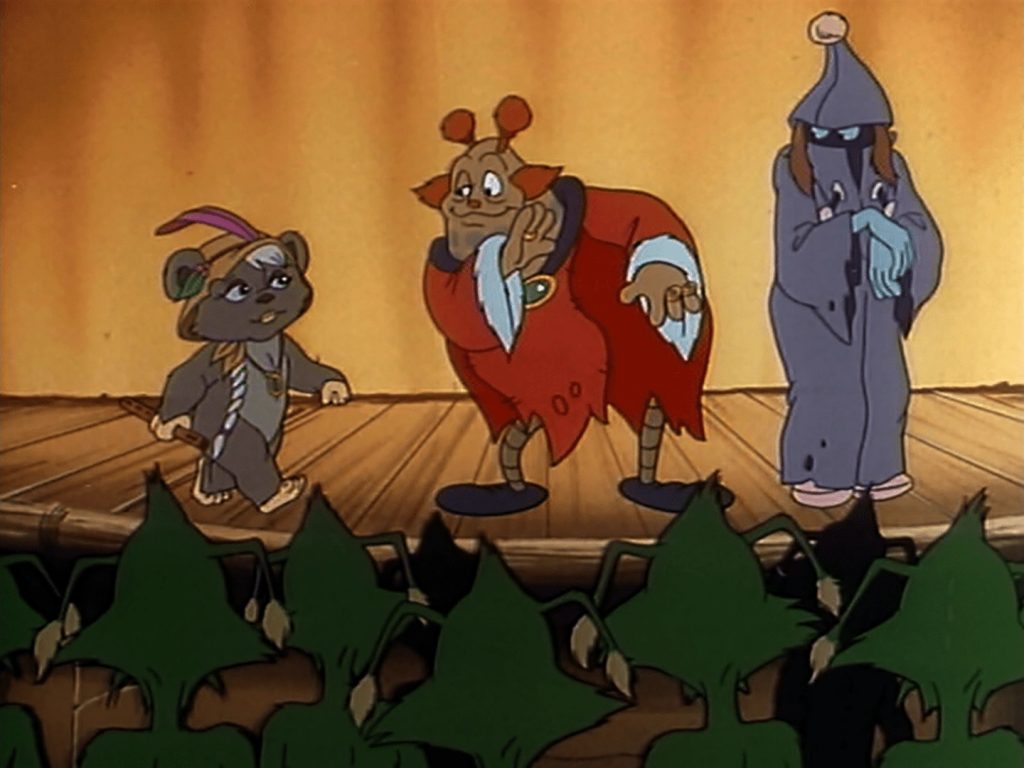
Capitalism requires indoctrination to perpetuate itself. Objective analysis of capitalism shows it to be an ultimately destructive force, and so to survive it must avoid analysis by the laboring class, who sacrifice their happiness so that capitalists might enjoy ever greater profit. As David Foster Wallace pointed out, fish don’t know they’re in water, so indoctrinating laborers into taking the systems and beliefs that support capitalism for granted is a great way to keep them from asking what the hell kind of muck they’re swimming through day after day.
“The Travelling Jindas,” the fifth episode of the Ewoks cartoon, puts Latara in the spotlight. She’s part of Wicket’s gang of friends, and all we know of her so far is that she plays the flute and flirts with Teebo. It’s her flute-playing, not her flirting, that’s important to this story, as she’s frustrated that nobody wants to listen to the new song she’s written. (Her song is identical to the music that plays over the closing credits, so maybe nobody wants to tell her it’s a little derivative.) As if her friends’ rude avoidance wasn’t bad enough, her father wants her to clean the hut, and her mother wants her to babysit her younger siblings. Latara’s had enough! Does no Ewok appreciate true artistry?
Fortunately for her, the Jindas, a travelling troupe of performers, have passed through the village, and she runs away with them, making her friends promise not to tell. Hilariously they immediately break this promise, telling shaman Logray where she’s gone off to. Sadly, the Jindas are notorious on Endor for always being lost and never being able to find their way back to a place once they’ve left it, so Latara is in danger of never being seen again. Her friends set out to rescue her.
The Jindas being perpetually lost is a pretty good summation of how this episode presents them. They’re nice enough folk, but a little dim, a bit irresponsible, and very egotistical. They live off of the charity of others, or at least that’s how we’re meant to see them. Freeloaders, Aunt Bozzie calls them; never mind that they’re skilled artists and the Ewoks universally love their show. They can be allowed to provide a night’s distraction, but Chief Chirpa makes it clear that this is a one-night-only event, and these vagabonds need to be on their way in the morning.
To Latara, the Jindas’ life is initially an attractive one, but she quickly finds it’s not all it’s cracked up to be. Travelling with them, she has to do even more drudge work than she did at home, and she never gets a chance to practice her music, let alone perform it. After the Jindas help her friends rescue her from the Duloks, she bids them a fond farewell, having learned an important lesson. The life of a performer is okay for some people, but responsible little Ewoks know that chores come first, art second.
The other Ewoks don’t learn any lesson at all, and will presumably continue to dismiss Latara’s artistic talent and passion.
If you want to perpetuate generational capitalism, you must indoctrinate not just current laborers, but future laborers as well.
Previous: Droids S1E4 – “A Race to the Finish” (1985)
Next: Droids S1E5 – “The Lost Prince” (1985)


